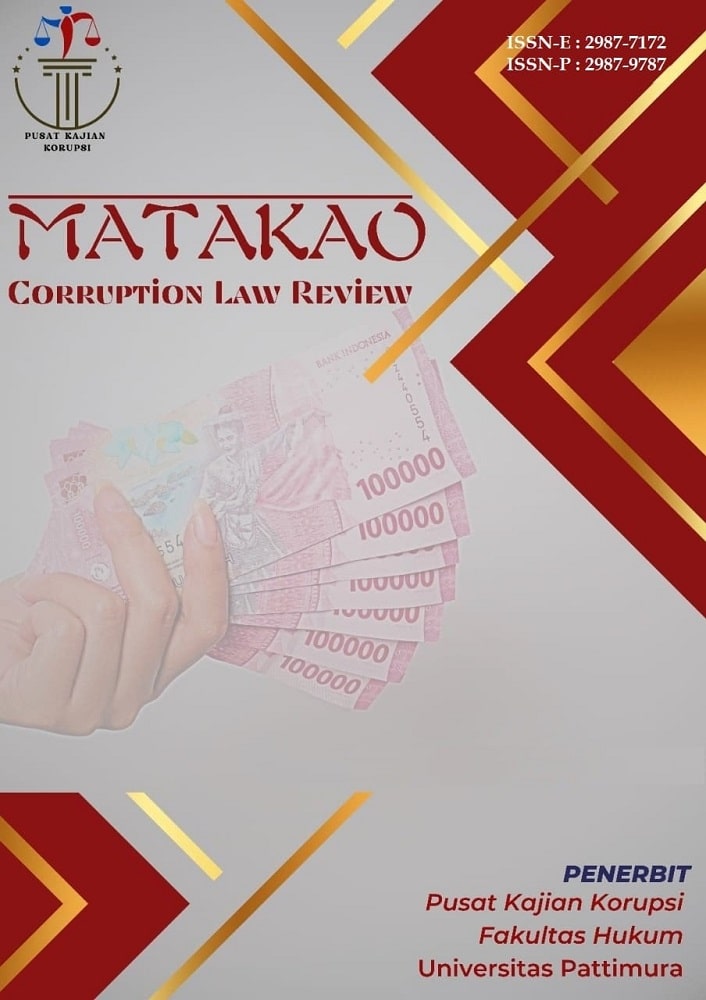Tindak Pidana Korupsi Yang Dilakukan oleh Perempuan
Abstract
Introduction: Women today commit many crimes. Crimes committed by women are very detrimental to themselves and even the country. The crime committed by women is corruption. Corruption committed by women is caused by factors, so that women enter the circle of corruption.
Purposes of the Research: This article aims to find out corruption crimes committed by women.
Methods of the Research: This paper uses the method of statutory approach (statute approach) and conceptual approach (conceptual approach).
Results of the Research: Corruption is a form of crime that often occurs and is not only known at the national level, but also internationall. The view that corruption has become a very big threat to the country and has even caused the country to decline. Corruption crimes today are not only committed by men, but women are starting to aggressively commit corruption crimes. Corruption committed by women is considered bad behavior and tarnishes oneself and even the family itself. Basically, crimes committed by women are things that are driven by the desire to be rich and even live a luxurious life, wrong relationships, lack of salary, abuse of position or position, influence of the environment in which one lives and even lack of understanding of religion. This is a factor for women to commit corruption crimes. For this reason, serious countermeasures are needed to suppress corruption crimes committed by women so that in the future women will no longer commit acts of corruption.
Downloads
References
Albert Hasibuan, Titik Pandang Untuk Orde Baru, Pustaka Sinar Harapan, Jakarta, 1997.
Andi Hamzah, Bunga Rampai Hukum Pidana dan Acara Pidana, Ghalia Indonesia, Jakarta, 2001.
Chatrina Darul Rosikah dan Dessy Marliani Listianingsih, Pendidikan Anti Korupsi, Sinar Grafika, Jakarta, 2016.
Denny Indrayana, Hukum di Sarang Koruptor, Kompas, Jakarta, 2008.
Evi Hartanti, Tindak Pidana Korupsi, Sinar Grafika, Jakarta, 2005.
IGM Nurdjana, Sistem Hukum Pidana dan Bahaya Laten Korupsi (Problematik Sistem Hukum Pidana dan Implikasinya pada Penegakan Hukum Tindak Pidana Korupsi), Total Media, Yogyakarta, 2009.
J. C. T. Simorangkir dkk, Kamus Hukum, Sinar Grafika, Jakarta, 2020.
Jawade Hafidz Arsyad, Korupsi dalam Perspektif HAN, Sinar Grafika, Jakarta, 2017.
Kementerian Pendidikan Dan Kebudayaan RI, Pendidikan Anti Korupsi untuk Pendidikan Tinggi, Direktorat Jenderal Pendidikan Tinggi bagian Hukum Dan Kepegawaian. Jakarta, 2011.
Leden Marpaung, Tindak Pidana Korupsi, Djambatan, Jakarta, 2007.
Lilik Mulyadi, Tindak Pidana Korupsi di Indonesia (Normatif, Teoritis, Praktik dan Masalahnya), Alumni, Bandung, 2007.
Matthew B. Milles dan Michel Huberman, Analisis Data Kualitatif, UII Press, Jakarta, 1992.
Moeljatno, Fungsi dan Tujuan Hukum Pidana Indonesia, Bina Aksara, Jakarta, 1998.Muhammad Shoim, Laporan Penelitian Individual (Pengaruh Pelayanan Publik Terhadap Tingkat Korupsi pada Lembaga Peradilan di Kota Semarang), Pusat Penelitian IAIN Walisongo Semarang, 2009.
Nadiatus Salama, Fenomena Korupsi Indonesia (Kajian Mengenai Motif dan Proses Terjadinya Korupsi), Pusat Penelitian IAIN Walisongo Semarang, 2010.
P A F Lamintang, Dasar-Dasar Hukum Pidana Indonesia, Citra Adityta Bakti, Bandung, 1996.
Peter Mahmud Marzuki, Penelitian Hukum, Kencana Prenada Media Group, Jakarta, 2011.
Ridwan A. Halim, Hukum Pidana dan Tanya Jawab, Ghalia Indonesia, Jakarta, 2002.
Robert Klitgaard, Membasmi Korupsi, Yayasan Obor Indonesia, Jakarta, 2001.
Soerjono Soekanto, Faktor-Faktor yang Mempengaruhi Penegakan Hukum, Rajawali Pers, 1983, Jakarta.
Surachmin & Suhandi Cahaya, Strategi & Teknik Korupsi, Sinar Grafika, Jakarta, 2011.
Copyright (c) 2024 Jennifer Ingelyne Nussy, Denny Latumaerissa (Author)

This work is licensed under a Creative Commons Attribution-NonCommercial 4.0 International License.
Copyright:
Authors who publish their manuscripts in this Journal agree to the following conditions:
- The copyright in each article belongs to the author, as well as the right to patent.
- Authors are able to enter into separate, additional contractual arrangements for the non-exclusive distribution of the journal's published version of the work (e.g., post it to an institutional repository or publish it in a book), with an acknowledgment of its initial publication in this journal.
- Authors are permitted and encouraged to post their work online (e.g., in institutional repositories or on their website) prior to and during the submission process, as it can lead to productive exchanges, as well as earlier and greater citation of published work.
- Authors have the right to self-archiving of the article (Author Self-Archiving Policy)
Licence : This Journal is disseminated based on the Creative Commons Attribution-NonCommercial 4.0 International license terms. This license allows anyone to copy and redistribute this material in any form or format, compose, modify, and make derivatives of this material for any purpose. You cannot use this material for commercial purposes. You must specify an appropriate name, include a link to the license, and certify that any changes have been made. You can do this in a way that is appropriate, but does not imply that the licensor supports you or your use.

This work is licensed under a Creative Commons Attribution-NonCommercial 4.0 International License..












